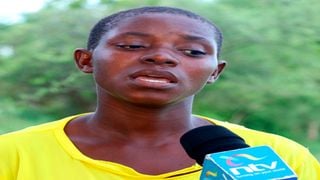
Salama Masha, one of the survivors who escaped from the Shakahola forest, tells her story on November 21, 2023. She says she could not stand fasting to death with her four children and had to find a way out.
| Wachira Mwangi | Nation Meda GroupKilifi
Premium
'How I survived Shakahola': Salama Masha's heart-rending story
We left Mombasa at 9am and began our journey to Shakahola village in Malindi.
We reached Shakahola by midday, amid heavy rain and a tense atmosphere. The past tragedy of the massacre lingered, a stark reminder of the lives lost earlier this year.
We set out to find a survivor, someone resilient in the midst of tragedy. We found her at around 6pm.
Salama Masha told her story, describing how she had spent the last few months in hiding, moving from town to town in a desperate search for safety.
Her voice echoed with strength, her story told of secrecy, resilience and the relentless pursuit of survival in the wake of unimaginable tragedy.
Masha is a survivor of the Shakahola massacre that killed 428 people earlier this year. But that is not all. She also saved her five children by fleeing in the nick of time as the tragedy was about to unfold.
Masha's story illustrates the resilience of the Shakahola survivors.
She says hers was not just a journey, but a testament to human strength in the face of adversity. It was a story that needed to be shared with the world.
"Before we moved from Malindi to Shakahola Forest, a foreign preacher was invited to the church to give sermons on the signs of the end of times," says Masha.
Masha vividly remembers the preacher telling stories about the signs of the end times, interweaving biblical verses with contemporary events.
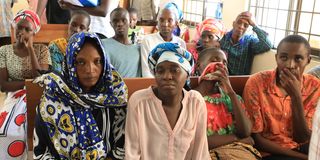
Some of the followers of Paul MAckenzie at arraigned at the Shanzu Law Courts
The congregation faithfully absorbed each word as gospel truth, plunging deeper into an abyss of cultic faith where doubt was never an option.
Masha explains that at the heart of the preacher's words were dire warnings about Jubilee government policies that were seen as contrary to Christian beliefs.
Cult leader Paul Mackenzie and the foreign preachers he invited said the government's Huduma Namba registration and Covid-19 vaccinations were signs of an encroaching anti-Christian ideology and the end times, urging the need for church members to "go back to God", Masha reveals.
The Huduma Namba was President Uhuru Kenyatta's government's single identity card that would have been issued to all citizens, replacing all other documents and becoming the single main identifier of citizens.
President William Ruto's government has launched a similar initiative, this time called Maisha Namba, but with similar features and benefits.
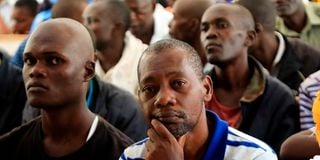
Kilifi cult leader Paul Mackenzie follows proceedings at the Shanzu Law Courts during the mention of his matter in this file photo.
These two main activities, Masha says, were used by the sect's preachers to draw parallels between current world events and the prophetic warnings written in ancient scriptures, both with the apocalyptic message that the world is coming to an end and that believers must be ready for the end of the world.
A total of 429 bodies have so far been exhumed from the vast Shakahola forest, 184 of them children, all believed to have starved to death before being buried in shallow graves.
The exhumations had been halted by the government, but are due to resume soon amid fears that more bodies may be in the graves.
According to Masha's first-hand account, the government's policies were portrayed as ominous symbols of an anti-Christian ideology, drawing parallels between current events and the prophetic warnings of the Bible's Book of Revelation.
"The preachers at Good News International Church quoted Bible verses until we believed every detail of the word," she recalls.
But how did Masha's brush with death begin?
By the time Masha joined Paul Mackenzie's Good News International Church, she was married.
"Both my husband and I were followers, but I did not often attend the sermons. When we were instructed not to visit hospitals or take our children to school, I obeyed because I saw that lifestyle as easier and simpler. My children had turned out to be good Bible readers, and I wondered if they could read the Bible so well, why did I need to take them to school?" recalls Masha.
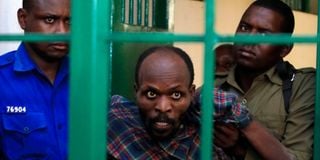
Mr Fredrick Karimi, one of the suspects accused alongside Pastor Mackenzie, inside the courtroom during the mention of their case at the Shanzu Law Courts in Mombasa on June 14.
As devoted followers of Mackenzie's teachings, when the church was closed in 2019 and the announcement was made to move to Jangwani, a name they gave to the Shakahola Forest, Masha and her family were the first to act on the idea.
"My husband told me that he had bought a piece of land in Shakahola, two acres for Sh2,000 and that we should move there to start a new life because some of the church members were also moving there. I agreed because I was excited that my husband had found two acres of land at a throwaway price," says Masha.
Having been born and raised in the Chakama sub-location, Masha was excited to move closer to home.
So they moved to Shakahola in 2020.
Unlike other followers who were forced to move by truck, Masha and her family left voluntarily.
They settled down and lived a happy life for two years, even taking up farming.
She had four children by then.
She conceived the fifth child in the forest and gave birth alone in her mud house.
"Things started to change in January 2023, when we were told to start fasting and break the fast in the evening. We fasted together with my children," she says.
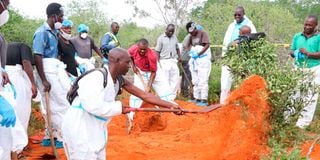
Locals from Shakahola Centre help dig up graves at Shakahola Forest part of the 800 acres linked with cult leader Paul Mackenzie of Good News International Church on June 6, 2023 during the third phase of the exhumation that was witnessed by Interior CS Kithure Kindiki.
A month later, in February, the last meeting in the forest was called by preachers, but Masha did not attend.
"A neighbour came and told me that they had been instructed not to tell me the details of the meeting because I was from the neighbourhood and would betray my fellow believers. I was told to start fasting with my children until we sleep (die)," says Masha.
Those who attended the meeting told Masha that it was led by a woman from Tanzania.
The villagers were also told not to visit each other and to stay in their own homes. They were urged to guard their homes by putting up thorny fences around them.
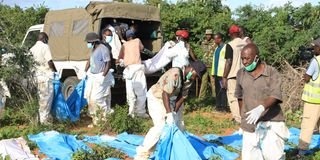
Bodies exhumed from mass graves in Shakahola forest, Kilifi County are loaded into a vehicle during the operation on May 12, 2023.
"I fasted for three days, but when I saw my children suffering, I could not bear it. I called my mother, who lived nearby, to come and get me. A few days later, my husband, who was so weak and emaciated by then, came to pick me up and asked us to go back and finish the fast so that we could all meet Jesus," said Masha.
She explains that "earthly hardships (looking for manual work to feed my children)" forced her to go back with her husband.
"The second time we fasted for seven days. My children cried asking for drinking water. I became weak, wondering why we were starving while my house was full of food. I could no longer stand it and asked my husband to take me back to my mother. He agreed, although he kept insisting that if we left we would go to hell with the children. I was taken back home and given a verbal divorce, which we call Sindikwa in our Giriama dialect," adds Masha.
Masha and her children escaped death, but she has no place to call home.

A Shakahola cult survivor is rescued from the forest in Malindi on April 25, 2023.
When the story of the Shakahola tragedy broke in March, Masha had just moved out. But life has not been easy, with constant threats.
"I cannot stay in one place for too long. That is why it was difficult for you (Nation journalists) to find me. I am receiving threats and the government had to intervene and take my four children to a rescue centre where they are. I am with my youngest, who is one year old.
Masha is now asking for a safe home as she fears for her life.
As for her ex-husband, Masha says she does not know his fate, although the police told her they had arrested him when he was weak and emaciated and promised to tell her when she could see him.
But Masha swears that she cannot go back to him.






